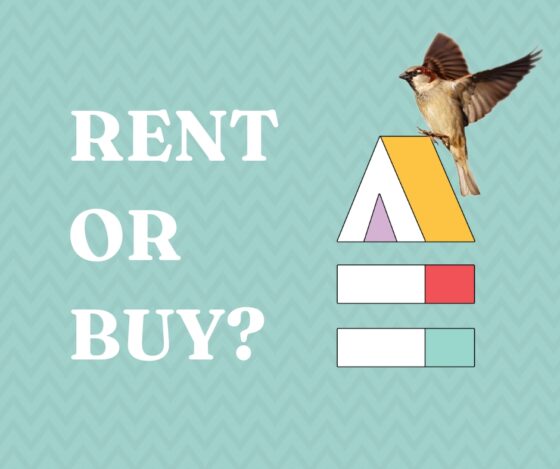Buying or renting a house? The pros and cons
What’s smarter, buying or renting? There are arguments for both options. Rental prices continue to rise, especially in big cities. Purchase prices are also skyrocketing, and there are many additional costs involved. On the other hand, you do pay off a mortgage, which means you eventually build up something. We list the pros and cons of renting and buying for you.

Renting: the pros and cons
Are you currently renting a house, living in a room, or still with your parents? Then it sometimes feels like everyone around you is buying a house except you. A consolation: you’re certainly not alone with this issue.
Renting is often portrayed as a waste of money. After all, that money could also be invested in a house. However, this overlooks all the advantages of renting.
The advantages
- Freedom: You can often cancel your rental contract on relatively short notice. It’s quite different with an owner-occupied house: it can sometimes take a long time to sell.
- No depreciation risk: You’re not dependent on the housing market. If the value of your home decreases, that’s a problem for the landlord.
- Rental protection: As a tenant, you have legal rental protection: you can’t just be evicted by the landlord. In some cases, you also have the right to rent price protection.
- No maintenance: Is something broken in your rental home? In the case of major maintenance, it’s the landlord’s expense. This saves you from unexpected expenditures.
- Housing benefit: Under certain conditions, tenants may be eligible for housing benefit, which significantly reduce their monthly costs.
The disadvantages
- Cannot adjust to preference: You often can’t adjust a rental home to your preference. Got permission from the landlord? Then, often, you won’t get back the investments of your refurbishment. And you might need to re-instate the original condition of the house if you decide to leave.
- Rent increase: Expect your rent to increase every year.
- Long waiting times: Due to the limited offer, rental homes often have long waiting times, especially in big cities. If you’re looking for a social rental home, you often must be registered with a housing corporation for years to stand a chance.
- Deposit: For private rentals, you often pay a deposit. You only get it back if you leave the house in good condition.
- No asset accumulation: Unlike with a house purchase, you don’t build up any equity with a rental property.
Social rent or private sector?
In the Netherlands, you can rent in the social or private sector. The difference between these two rental markets lies in the rent price. A so-called liberalisation threshold separates social rent and private sector rent. This threshold is set annually.
If the starting rent price of a home is below this threshold, it’s social rent. If the rent price is above, the rental home is liberalised: it falls into the private sector.
This liberalisation threshold is also the limit for housing benefit eligibility. You are eligible for housing benefit only if you rent a home under the liberalisation threshold. Is your rent above this limit? Then you have no right to it, regardless of your income.
Conditions for social rent
If you want to qualify for a social rental home, you must meet certain conditions. These conditions are on the government’s website.
Renting in the private sector
If you do not meet the conditions for social rent, you can look for a rental home in the private sector.
As the name suggests, landlords of private rental homes have much more freedom to determine their rent price: for homes in the private sector, there is (for now) no maximum rent. This often results in high prices, especially in and around big cities. Is the demand high? Then rents in the private sector also rise.
Buying: the pros and cons
Is buying a better idea in your situation? We have also listed the pros and cons for you.
The advantages
- Adjust to your wishes: as a homeowner, you can largely decide how to arrange your house. So, remodelling is usually not a problem.
- Stable monthly costs: Your monthly mortgage costs remain relatively stable over the years, especially if you opt for a long fixed-rate period. Often, your mortgage costs are even lower than what you would pay in rent.
- Building equity: You build equity by paying off your mortgage monthly. At the end of your mortgage term, you have repaid the full loan, and the house is yours. If the value of your house increases, you could also profit from that when selling.
- Starter schemes: Since 2021, buyers (under certain conditions) no longer have to pay transfer tax. In some municipalities, starters can also qualify for a starter loan.
- Sustainable investment: Are you going to make your purchased home more sustainable? Then, you often save on energy costs in the long term.
The disadvantages
- Less easy to move: With a purchased house, you must arrange much more around your move. You may not sell your house as quickly as you hoped, and you may lose money on, for example, a selling agent and a notary.
- Changing interest rates: Do you have a mortgage with a variable interest rate? Then, your living costs change as the interest rate falls or rises. These changes are hard to predict.
- Maintenance costs: Need renovations? Then you, as a homeowner, have to arrange that yourself.
- Insurances and taxes: As a homeowner, you must have building insurance and you have to pay annual taxes to your municipality and the water board.
- Risk of debt: Your house can decrease in value. Is your house worth less than your mortgage at the time of sale? Then your house is ‘underwater’, and you end up with a residual debt.
- High one-time costs: When buying, you incur transaction costs for the transaction.